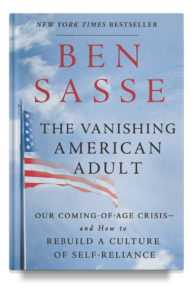This week, Senator Sasse released a new book, Them: Why We Hate Each Other and How to Heal. Check out an excerpt from the book below:
We have a crisis in this nation, and it has nothing to do with regulatory reform or marginal tax rates. This book is not going to be about politics. (Sorry to disappoint.) It’s about something deeper and more meaningful. Something a little harder to quantify, but a lot more personal.
Despite the astonishing medical advances and technological leaps of recent years, average life span is in decline in America for the third year in a row. This is the first time our nation has had even a two-year drop in life expectancy since 1962—when the cause was an influenza epidemic. Normally, declines in life expectancy are due to something big like that—a war, or the return of a dormant disease.
But what’s the “big thing” going on in America now? What’s killing all these people?
The 2016 data point to three culprits: Alzheimer’s, suicides, and unintentional injuries—a number that includes drug and alcohol deaths. Two years ago, 63,632 people died of overdoses. That’s 11,000 more than the previous year, and it’s more than the number of Americans killed during the entire, twenty-year Vietnam War. It’s almost twice the number killed in automobile accidents annually, which had been the leading American killer for decades. In 2014, suicides hit a thirty-year high—and the sobering climb shows no signs of abating: the percentage of young people hospitalized for suicidal thoughts and actions has doubled over the past decade.
We’re killing ourselves, both on purpose and accidentally.
We’re literally dying of despair.
And this is not even to mention the data about how we’re having less sex and making fewer babies—both of which are, across history, signs of diminished hope in the future.
It turns out that the massive economic disruption that we entered a couple of decades ago and will be navigating for decades to come is depriving us psychologically and spiritually at the same time that it’s enriching us materially. The same technology that has liberated us from so much inconvenience and drudgery has also unmoored us from the things that anchor our identities. The revolution that has given millions of Americans the opportunity to live like royalty has also outpaced our ability to figure out what community, friendships, and relationships should look like in the modern world. As reams of research now show, we’re richer and better-informed and more connected—and unhappier and more isolated and less fulfilled.
There is a terrible mismatch here.
We’re in crisis.

 A101 Team
A101 Team 